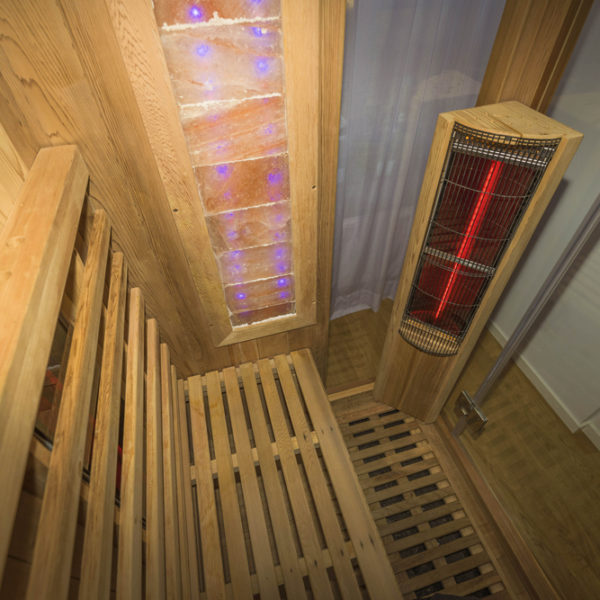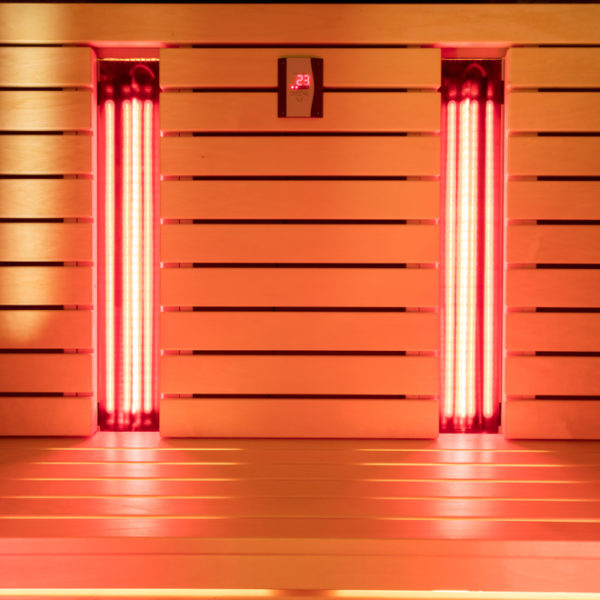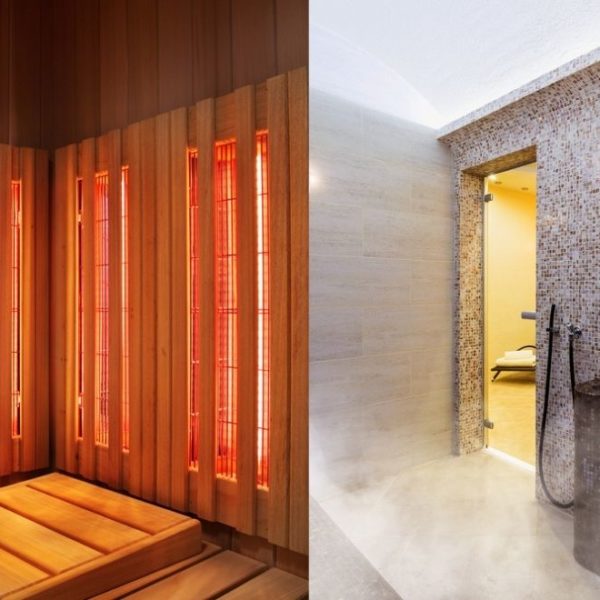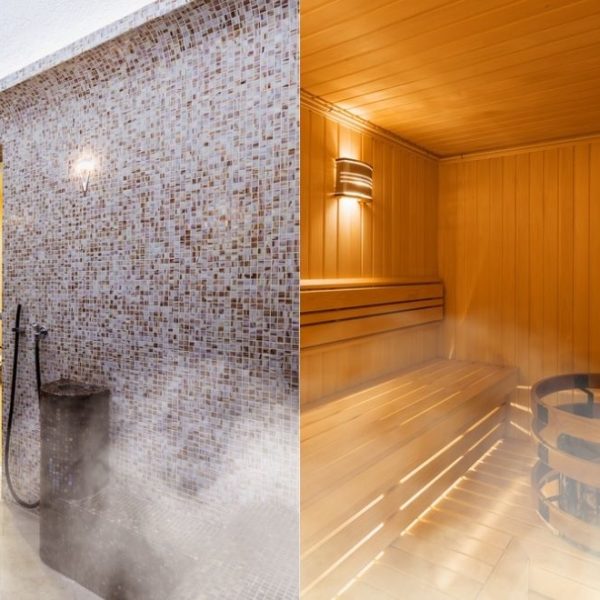Saunas are becoming ever more popular as a great way to relax. Infrared saunas in particular are having a renaissance. Many people see a regular sauna as a way of reducing stress and improving their health too. But sometimes the reality doesn’t live up to the claims.
If you’ve been asking yourself, “Why do I feel worse after an infrared sauna?”, you’re not alone. So what’s going on?
We’re going to investigate the reasons some people feel worse after their sauna. And we’ll give you some hints and tips to address the problem.
So if you’re ready, let’s get started!
What is an Infrared Sauna?
Let’s start by taking a look at what an infrared sauna is, and what makes it different from traditional saunas.
Traditional models are known as Finnish saunas, because they originated in Finland. They take the form of a wooden cabin with a bench inside to sit on. The heating element is covered in coals. From time to time, water is ladled on top of the coals to produce steam.
With an infrared sauna, on the other hand, the heat is produced by infrared lights. The lights heat up the objects inside the sauna – including people – directly. That’s different from a traditional sauna, where the air temperature is increased.
As a result, the temperature in an infrared sauna is significantly lower than in a Finnish sauna. It’s around 120 to 130 degrees Fahrenheit, compared to between 150 and 195 degrees. Many people find it more comfortable to relax in as a result.
And because the heat is generated by lights, infrared saunas can be smaller than versions that use heaters and coals. You can find compact sauna tents, and you can even wrap yourself in a sauna blanket.
But whether you’re sitting on a bench, or lazing in a sauna blanket, the idea is to relax and sweat. So why could you be feeling worse when you finish your session than you did at the beginning?
The myths
There’s an awful lot of nonsense out there when it comes to the way saunas affect your body. And some of that nonsense is used to “explain” why you might not feel great after a session. So let’s start by debunking some myths.
A sauna – whether traditional, infrared or sauna blanket – does one thing: it makes you hot. Your body responds to that heat by sweating and dilating your blood vessels.
A sauna doesn’t melt away fat. It doesn’t cleanse your body of toxins – with the exception of a truly tiny amount in your sweat. It doesn’t “simulate a fever”, and it doesn’t provoke your immune system into producing antibodies. It doesn’t do anything to your cells either.
Bear that in mind when you read some of the supposed explanations for feeling unwell after a sauna session.
There’s nothing taking place “at the cellular level” when you have a sauna. Your body doesn’t need to adapt to it, any more than it needs to adapt to a hot day. So carrying on doing the same thing in the hope that you’ll suddenly stop feeling ill isn’t going to work.
You may also come across claims that the sauna “stirs up” toxins. In some cases, it’s claimed, people’s systems aren’t equipped to deal with these recirculating toxins. That’s why you feel ill.
There’s no actual scientific evidence behind this explanation at all. So before you splash out on “gut binders” to round up those stray toxins, consider a simpler explanation. It’s the heat that’s causing your discomfort, and/or the loss of water in the form of sweat.
Let’s look at what’s really happening when you take a sauna.
Too Much Heat and Dehydration
Your body needs to maintain a constant internal temperature of around 98.6 degrees Fahrenheit. When you’re in a sauna, all the heat means your body has to take action to cool itself. It does this in a number of ways.
One is by dilating your blood vessels, which can give some people a flushed appearance. The bigger surface area of your dilated blood vessels allows the heat to disperse more rapidly.
The other main way your body cools itself is by sweating. The moisture on the surface of your skin evaporates, cooling it down.
But too much sweating can be a problem. That’s because it’s removing water from your body – and your body needs water in order to function. If the level of water in your body drops too low, you become dehydrated.
So what might this feel like?
Heat exhaustion
Too much heat means your body cannot cool itself quickly enough. That can lead to heat exhaustion and even heat stroke.
Heat exhaustion is the milder of the two problems. Its symptoms include dizziness or light-headedness, heavy sweating, and a general feeling of weakness. Your pulse may become faint but rapid, and you may feel sick or vomit. Your skin can become pale and clammy, and you can feel faint or even pass out.
If your body continues to be exposed to too much heat for even longer, heat stroke may follow. This is a much more serious condition. It can damage your muscles, heart, kidneys and brain. And left untreated, it can even be fatal.
Heat stroke is accompanied by a high temperature, above 103 degrees Fahrenheit. You may lose consciousness and your pulse may be strong and rapid. And your skin may appear red, as well as being hot to the touch.
If you experience any of the symptoms of heat exhaustion, leave the sauna immediately. It is not an endurance test, and remaining there will not build up your tolerance. You will simply become increasingly unwell. And the effects can be very serious.
If you suspect you have heat stroke, call for emergency medical assistance.
Know Your Risk Profile
Dehydration, heat exhaustion and heat stroke are serious problems. But for most people, that doesn’t mean it’s necessary to avoid using saunas or sauna blankets. It simply means that they need to be used sensibly. So how do you do that?
To begin with, it’s helpful to understand that the risks are higher for some people.
- Children under 4 and adults over 65 years old are generally more sensitive to the effects of heat.
- The same goes for people who have hyperthyroidism and multiple sclerosis, or any condition affecting the nerves and motor function. The latter can make people less able to notice the effects of the heat. That can mean they can suffer from burns without realising what’s happening.
- If you have a cardiovascular condition, or any form or heart arrhythmia, talk to your doctor before using a sauna. The heat can increase your heart rate and cause arrhythmia in some people.
- If you’re pregnant or have low blood pressure or kidney disease, you’ll also be more vulnerable to the effects of heat. The same applies if you’re taking medication for low blood pressure, diuretics or any medicine that can cause dizziness.
- And if you have a wound or irritated skin, wait until it’s healed before you use a sauna. The heat can cause further irritation. Open wounds are vulnerable to infection too. That’s a particular risk if you’re using a public sauna.
If you fall into any of these categories, check with your doctor before taking a sauna.
Ways to Guard Against Problems
When using a sauna, there are several steps you can take to minimize any risk of problems.
- To start with, make sure you’re properly hydrated before you enter the sauna. Don’t drink alcohol beforehand, and drink plenty of water. It’s also good to sip water while you’re in the sauna, and take another big drink when you leave.
- Don’t turn your sauna up to the max. There’s no need – you’ll get that feeling of wellbeing at a lower temperature. And you’ll avoid overheating your body and causing harm.
- If you haven’t used a sauna before, you won’t know how long feels right to you. Don’t feel you have to stay in there for a pre-set period. Start with a shorter session. You can try a longer one later if you want to.
- Listen to your body during your sauna session. If you feel uncomfortable or unwell, get out straight away and drink plenty of water. If you still feel dizzy or light-headed after leaving the sauna, seek medical help.
Use the Sauna Safely
That brings us to the end of our look at the question of “Why do I feel worse after an infrared sauna?”
It’s always important to listen to your body. Don’t ignore feelings of illness or discomfort – they’re a warning that something isn’t right. Make sure you stay hydrated, and don’t overdo the heat. If you start to feel unwell, get out of the sauna.
If you’re pregnant, check with your doctor before using a sauna. The same applies if you have a cardiovascular condition, kidney disease, hyperthyroidism, multiple sclerosis or low blood pressure. And if you have irritated skin or an open wound, wait for it to heal before getting into a sauna.
Remember – it’s all about the heat and sweating! So all this advice applies equally whether you’re using an infrared sauna, a Finnish sauna or even a sauna blanket.
Sensible precautions will enable most people to enjoy the sauna experience without any adverse effects.








